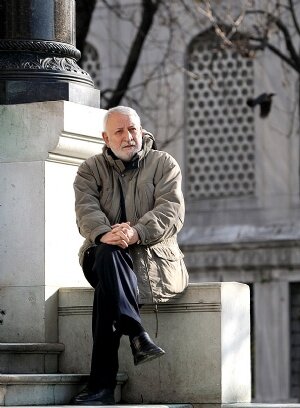Yücel Çakmaklı was born in 1937 to a civil servant and his wife in Afyon (western Anatolian city in Turkey). His mother was a member of a Muslim religious order, the Mevlevi Order (a mystical current of Islam). Due to the early death of his father, Çakmaklı and his three siblings were placed with relatives. He himself subsequently grew up with his grandparents. Since the village where he lived was very far from the school, he was placed in an orphanage during his school years. His grandfather, a village imam, played an important role in the filmmaker’s life. For example, Çakmaklı says in an interview that he was fascinated by his grandfather’s stories even back then. He discovered his passion for storytelling during his sermons during Ramadan.1
After primary and secondary school, he came to Istanbul in 1955 to study economics. During his studies, he held various temporary jobs. Among other things, he worked as an usher. His job as a programmer at the Şan Sineması, which was built in 1953 and was a popular cultural center in Istanbul in the 1980s, was certainly formative. After his military service, he returned to Istanbul and started working as a film critic for Yeni İstanbul newspaper and magazines such as Düşünen Adam and Yeni İstiklal.
Before beginning his career in the film industry, he was involved with philosophical-theoretical approaches of a so-called “Millî Sinema”. As a countercurrent to the pronational (Halit Refiğ) and leftist-revolutionary cinema (Yımaz Güney) of the 1960s and 1970s, Çakmalı developed a pro-Islamic film direction. In 1964, he wrote the film manifesto “Millî Sinema” (“National Cinema”), “which emphasizes Turkey’s historical and national values and declares Islam as the superior and all-encompassing authority. Turkish, Anatolian, Ottoman as an identity of the population to be valued, i.e. the so-called “millets” (hence the name of his film program) still play[ed] an essential role, [but was] to be subordinated to Islam” (Alkin, 2020: 34). His first feature film, Birleşen Yollar (1970), is a cinematic exploration of his Islamic nationalist worldview. Birleşen Yollar was, in fact like most of his subsequent works – the film adaptation of a classic of Islamic literature, namely the novel “Huzur Sokağı” by Şule Yüksel Şenler, which is about the story of a high-society woman who falls in love with an impoverished, devout man and transforms her life into piety.

Çakmaklı gained his first experience in the film industry as an assistant director with well-known Yeşilçam2 directors (including Osman F. Seden and Orhan Aksoy). In 1969, he founded his own film production company Elif Film. The filmmaker divides his creative phases into 3 periods: Between 1970 and 1975 is the creative phase of the first feature films. Then comes the period (1975-1990) of the production of television series for the public broadcasting company of Turkey TRT (Türkiye Radyo ve Televizyon Kurumu). During this period, he received the Jury Prize of the Prague Film Festival (1978) for the TV films Çok Sesli Bir Ölüm (1977) and Çözülme (1977). In the last phase between 1990 and 2006, Çakmaklı mainly realized shoots for series and feature films for the private sector.
In 2008, he received the State Medal of Distinguished Service (Devlet Üstün Hizmet Madalyası) for his television productions. During his active creative period, which lasted from 1969 to 2004, Çakmaklı made numerous cinema and TV films as well as television series, with which he tried to implement the basic idea articulated in his film manifesto: Turkish cinema must produce “films that reflect the belief of the Turkish people (including their villagers and townspeople) in the superiority of spiritual values over material values, national characters, and the Anatolian reality created by tradition” (Çakmaklı 2014 [1964], translation from Alkin 2019).
Çakmaklı’s worldview and scripts were influenced by Turkish writers and poets such as Necip Fāzıl Kısakürek, Peyami Safa, Tarık Buğra, and Şule Yüksel Şenler, whose works accentuate a Turkish-Islamic value orientation.

Cakmaklı’s work was based on a close connection between the Islamic conservative literature of those years and intellectual figures. The preservation of national culture and identity, as well as the criticism of an internalization of Western culture, are at the center of most of his 32 productions (21 films and 11 series) in the spirit of Occidentalism.
He died in 2009 in the course of heart surgery and was buried in the presence of then-Prime Minister Recep Tayyip Erdoğan.
Text and editing: Hayriye Kapusuz
1 https://www.karar.com/yazarlar/hakan-albayrak/yucel-cakmaklinin-enistesine-verdigi-soz-4772 (Zugriff am 10. März 2021).
2 Die Yeşilçam-Ära war mit teilweise mehr als 300 Filme pro Jahr eine der produktivsten Phasen türkischer Filmhistorie zwischen 1960-1980.
Bibliographie:
Alkın, Ömer (2019): Die visuelle Kultur der Migration. Geschichte, Ästhetik und Polyzentrierung des Migrationskinos. Reihe: Postmigrantische Studien. Bielefeld: transcript Verlag.
Alkın, Ömer (2019): Erinnerungskultur und Mediengeschichte postmigrantisch. Die Figur der Migration im türkischen Kino. In: Sungu, Can & Lippmann, Malve (Hg.) (2020) Berlin: Archive Books
Çakmaklı, Yücel. 2014. Milli Sinema Ihtiyacı. In Yücel Çakmaklı. Milli sinemanın kurucusu, hg. Burçak Evren, 16-17. Istanbul: Küre Yayınları.